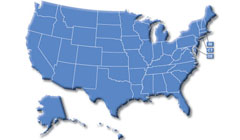 By Sara Pitcher
By Sara Pitcher
Noblesville, Indiana Divorce Lawyer
If divorcing parties physically separate and move to different counties, or even different states before legally separating, this can raise questions as to where to where the jurisdiction is in order to file for the dissolution of the marriage or the legal separation.
In order to determine which is the proper court in which to bring your action for dissolution or legal separation, you must look at which court would have jurisdiction over the action and over the parties involved.
Divorce From A Distance:
Subject Matter Jurisdiction
Jurisdiction over the action itself is called subject matter jurisdiction. Often, the statutes of a state will identify which courts of the state may hear a dissolution or separation action.
Frequently, however, either circuit or superior courts have subject matter jurisdiction over dissolution or separation actions. This just means that those courts have the authority to hear and decide issues relating to dissolution of marriage or legal separations and it would be proper to file one of those actions in those courts.
Personal Jurisdiction
The statutes may also describe other criteria for a court to have jurisdiction over the parties. For example, many states require that an individual is a resident of the state for a certain number of months before filing for divorce or legal separation.
Jurisdiction over the husband, wife, and children, if any, is called personal jurisdiction. That means the court has the authority to issue orders binding the persons involved in the action. Personal jurisdiction may be a little more difficult to determine in certain instances than subject matter jurisdiction.
To determine personal jurisdiction, many states have established trial rules or statutes to describing acts that constitute sufficient minimum contacts with the state to justify being haled into court there.
Common acts sufficient to establish personal jurisdiction over an individual include:
1.) Conducting business within the state;
2.) Causing injury to persons or property within the state by an act or omission to act within the state; contracting to furnish goods or services within the state;
3.) Owning, possessing, or using real property within the state;
4.) Living in the state in a marital relationship, notwithstanding subsequent departure from the state;
5.) Abusing, harassing, or disturbing the peace of, or violating a protective or restraining order for the protection of, any person within the state by an act or omission done in the state, or outside the state if the act or omission is part of a continuing course of conduct having an effect in the state; and
6.) A state may exercise jurisdiction on any basis not inconsistent with the Constitutions of the state or the United States.
In addition, if an individual is served while within the physical boundaries of the state, that is sufficient to establish minimum contacts with the state to establish personal jurisdiction over the individual.
For example, a husband and wife have separated and the wife moves to Indiana and the husband lives in Missouri. The parties have children that split their time between both parents. The parties have had these living arrangements for over six months.
If the wife were to file for divorce in Indiana, she could have the husband served with the divorce pleadings while he was picking up the children in Indiana for his parenting time, and that is sufficient to establish that Indiana will be the proper place for all of the dissolution proceedings to occur.
Even if the husband and wife have no children together and the husband is driving through the state of Indiana on his way to visit friends in Ohio and stops for gas or food and is served then, that is sufficient contact with the state for the state to exert jurisdiction over the husband.
In both of those instances, the divorce proceedings would occur in Indiana if all other procedural and jurisdictional requirements were met.
Read Related Articles:
Uniform Child Custody Jurisdiction Enforcement Act
In addition to all of the above jurisdictional considerations, an additional statute must be considered when the parties have children. Currently all states except Maryland have adopted some form of the Uniform Child Custody Jurisdiction Enforcement Act (UCCJEA).
This act was created in order to prevent one parent from running to a different state with the children and filing a custody action. Now, under this act, the court will look to which state was the child’s home state for the previous six months in order to determine whether jurisdiction over the parties and their children is proper.
The courts will also look at whether another state would have jurisdiction over the child under the act, whether the child and a parent have a significant connection to the state, and whether the majority of the evidence and witnesses are located in the state.
Read Related Articles:
Agreeing To Jurisdiction
A party may also waive jurisdictional requirements and agree to jurisdiction in a court. This can be done by not raising any jurisdictional arguments and simply responding to the initial filing documents, such as a request for a hearing on parenting time, child custody, and other preliminary matters.
Unfortunately, a party may unknowingly waive any jurisdictional arguments they may have by responding to a pleading. Any response other than an objection to jurisdiction is deemed a waiver of any arguments that may be available to the party.
Objections to jurisdiction should be made as soon as possible to protect your interests. A party must not respond to the original pleading with anything other than an objection to jurisdiction.
For this reason, no counter-petition for dissolution or request for a hearing on any parenting time or child custody issues may be filed until jurisdiction is objected to.
Because of this, if an individual is served with any court documents in a county or state different from his residence, his or her best course of action would be to contact an attorney in the state where the action was originally filed to discuss his options for contesting jurisdiction of the court and to determine the best course of action for establishing where jurisdiction would be preferred so a case can be commenced as quickly as possible and the preliminary issues of the case can be addressed.
Once a spouse files for divorce or separation, if distance is a factor, the best course of action would be to contact an attorney to determine your jurisdictional options prior to responding.
Cordell & Cordell has fathers rights lawyers located nationwide.
 To arrange an initial consultation to discuss divorce rights for men with a Cordell & Cordell attorney, including Noblesville, Indiana Divorce Lawyer Sara Pitcher, contact Cordell & Cordell.
To arrange an initial consultation to discuss divorce rights for men with a Cordell & Cordell attorney, including Noblesville, Indiana Divorce Lawyer Sara Pitcher, contact Cordell & Cordell.


One comment on “Divorce Jurisdiction: Divorcing When Living In Separate States”